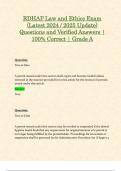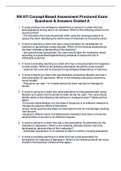RDHAP Law and Ethics Exam
(Latest Update)
Questions and Verified Answers |
100% Correct | Grade A
Question:
True or false
A permit issued under this section shall expire and become invalid unless
renewed in the manner provided for in this article for the renewal of permits
issued under this article.
Answer:
True
Question:
True or False
A permit issued under this section may be revoked or suspended if the dental
hygiene board finds that any requirement for original issuance of a permit is
no longer being fulfilled by the permitholder. Proceedings for revocation or
suspension shall be governed by the Administrative Procedure Act (Chapter 5
,(commencing with Section 11500) of Part 1 of Division 3 of Title 2 of the
Government Code).
Answer:
True
Question:
True or False
If charges of unprofessional conduct are filed against the holder of a permit
issued under this section, or a member of an association, partnership, group,
or corporation to whom a permit has been issued under this section,
proceedings shall not be commenced for revocation or suspension of the
permit until a final determination of the charges of unprofessional conduct,
unless the charges have resulted in revocation or suspension of a license.
Answer:
True
Question:
"Standard precautions":
Answer:
are a group of infection prevention practices that apply to all patients,
regardless of suspected or confirmed infection status, in any setting in which
healthcare is delivered. These include hand hygiene, use of gloves, gown,
mask, eye protection, or face shield, depending on the anticipated exposure,
and safe handling of sharps. Standard precautions shall be used for care of all
patients regardless of their diagnoses or personal infectious status.
,Question:
"Critical items" are
Answer:
confer a high risk for infection if they are contaminated with any
microorganism. These include all instruments, devices, and other items used
to penetrate soft tissue or bone.
Question:
"Semi-critical items" are
Answer:
instruments, devices and other items that are not used to penetrate soft tissue
or bone, but contact oral mucous membranes, non-intact skin or other
potentially infectious materials (OPIM).
Question:
"Non-critical items" are
Answer:
instruments, devices, equipment, and surfaces that come in contact with soil,
debris, saliva, blood, OPIM and intact skin, but not oral mucous membranes.
, Question:
"Low-level disinfection" is
Answer:
the least effective disinfection process. It kills some bacteria, some viruses and
fungi, but does not kill bacterial spores or mycobacterium tuberculosis var
bovis, a laboratory test organism used to classify the strength of disinfectant
chemicals.
Question:
"Intermediate-level disinfection" kills
Answer:
mycobacterium tuberculosis var bovis indicating that many human pathogens
are also killed. This process does not necessarily kill spores
Question:
"High-level disinfection" kills some, but not necessarily all
Answer:
bacterial spores. This process kills mycobacterium tuberculosis var bovis,
bacteria, fungi, and viruses





